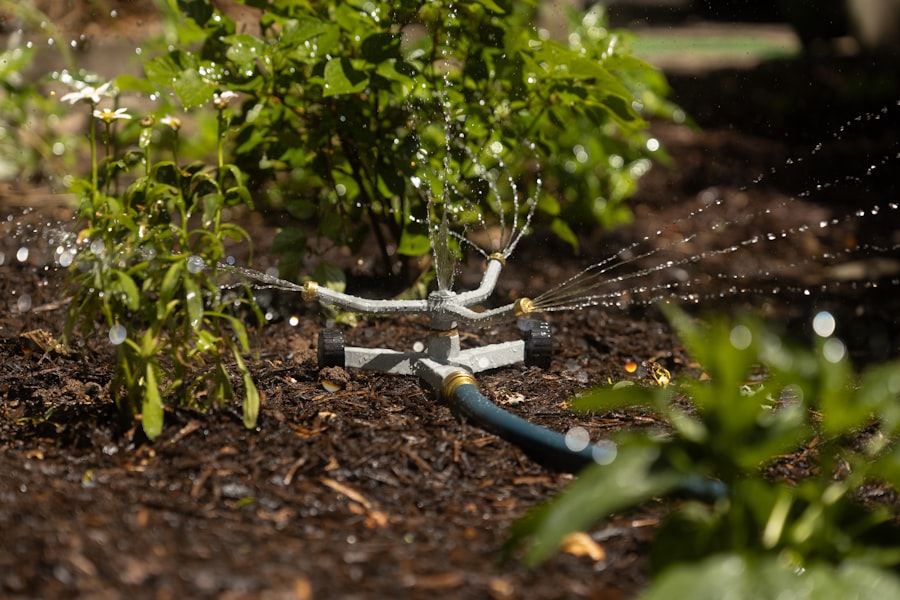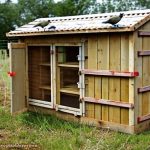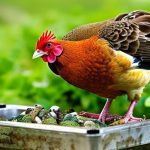Raccoons are intelligent and adaptable nocturnal mammals that can threaten chicken coops. Their dexterous paws enable them to manipulate latches and locks, while their climbing abilities allow them to scale fences and walls. Raccoons possess a keen sense of smell, which helps them locate food sources from a distance.
As opportunistic feeders, raccoons target chickens and their eggs as an easy food source. They are skilled hunters capable of catching and killing chickens. Raccoons can also carry diseases, including rabies, posing risks to humans and other animals.
These animals thrive in both urban and rural environments due to their adaptability. Raccoons are persistent problem-solvers and will repeatedly attempt to access food sources. Their behavior and capabilities make them a consistent threat to chicken coops.
Understanding raccoon behavior is crucial for developing effective strategies to protect chicken coops and flocks from these predators. Implementing comprehensive security measures is essential to safeguard chickens against raccoon attacks.
Table of Contents
- 1 Securing the Chicken Coop: Tips for Fortifying the Enclosure
- 2 Implementing Deterrents: Using Smells and Sounds to Repel Raccoons
- 3 Nighttime Vigilance: Taking Precautions to Protect Chickens After Dark
- 4 Proper Waste Management: Minimizing Attractants for Raccoons
- 5 Predator-Proofing the Perimeter: Fencing and Other Physical Barriers
- 6 Seeking Professional Help: When to Call in a Wildlife Expert
- 7 FAQs
- 7.1 What are some effective ways to keep raccoons away from chickens?
- 7.2 Why are raccoons a threat to chickens?
- 7.3 What are some signs that raccoons are targeting my chickens?
- 7.4 Are there any natural deterrents for keeping raccoons away from chickens?
- 7.5 What should I do if I suspect raccoons are targeting my chickens?
Key Takeaways
- Raccoons are intelligent and adaptable creatures, known for their curiosity and dexterity.
- Secure the chicken coop by using sturdy materials, burying wire mesh, and installing locks on doors and windows.
- Implement deterrents such as ammonia-soaked rags, predator urine, and motion-activated lights or sound devices.
- Be vigilant at night by locking up the coop, using automatic door closers, and installing security cameras.
- Proper waste management is crucial to minimize food sources for raccoons, so secure trash cans and clean up spilled food.
Securing the Chicken Coop: Tips for Fortifying the Enclosure
Sealing Entry Points
This includes checking for any gaps or holes in the coop walls, roof, and floor, as raccoons are known for their ability to squeeze through small openings.
Reinforcing Doors and Windows
It is also important to reinforce doors and windows with heavy-duty locks and latches to prevent raccoons from gaining access. Installing hardware cloth or welded wire mesh around the perimeter of the coop can provide an additional layer of protection against raccoon intrusion. This material should be buried at least 12 inches into the ground to prevent raccoons from digging underneath the enclosure.
Additional Security Measures
Additionally, adding a roof to the chicken run can help deter raccoons from climbing over the fence and gaining access to the chickens. Another important aspect of securing the chicken coop is to keep the surrounding area free of clutter and debris that could provide hiding spots for raccoons. Keeping the area well-lit can also help deter raccoons from approaching the coop.
By implementing these tips for fortifying the enclosure, chicken owners can significantly reduce the risk of raccoon attacks and protect their flock from these cunning predators.
Implementing Deterrents: Using Smells and Sounds to Repel Raccoons
Implementing deterrents such as smells and sounds can be an effective way to repel raccoons from the vicinity of the chicken coop. Raccoons have a keen sense of smell, and certain odors can be highly unpleasant and off-putting to them. For example, ammonia-soaked rags or cotton balls placed around the perimeter of the coop can help deter raccoons from approaching.
Additionally, using strong-smelling herbs such as mint, lavender, or rosemary can also help repel raccoons. Another effective deterrent is using sound to scare off raccoons. Playing loud noises or using motion-activated devices that emit high-pitched sounds can startle raccoons and discourage them from approaching the chicken coop.
It is important to regularly change the location of these devices to prevent raccoons from becoming accustomed to the sounds. In addition to using smells and sounds as deterrents, it is important to regularly clean and maintain the chicken coop to minimize potential attractants for raccoons. This includes promptly removing any spilled feed, securing garbage cans, and keeping the area around the coop free of food scraps.
By implementing these deterrents, chicken owners can create an environment that is less appealing to raccoons and reduce the likelihood of raccoon attacks on their flock.
Nighttime Vigilance: Taking Precautions to Protect Chickens After Dark
Taking precautions to protect chickens after dark is crucial in preventing raccoon attacks. Raccoons are primarily nocturnal animals, making nighttime vigilance essential in safeguarding the flock. One important precaution is to ensure that all chickens are securely locked inside the coop at night.
This can be achieved by installing automatic door closers or manually closing and securing coop doors before dusk. It is also important to regularly inspect the perimeter of the coop for any signs of raccoon activity, such as tracks or droppings. By staying vigilant and monitoring for any potential threats, chicken owners can take proactive measures to prevent raccoons from gaining access to the coop.
Additionally, installing motion-activated lights around the coop can help deter raccoons from approaching during the night. Another important precaution is to avoid leaving food sources outside of the coop overnight. This includes securing feeders and waterers inside the coop and removing any leftover food scraps from the chicken run.
By minimizing potential attractants for raccoons, chicken owners can reduce the likelihood of nighttime attacks on their flock. Taking these precautions to protect chickens after dark is essential in ensuring their safety and well-being.
Proper Waste Management: Minimizing Attractants for Raccoons
Proper waste management is crucial in minimizing attractants for raccoons and reducing the risk of attacks on the chicken coop. Raccoons are opportunistic feeders and will take advantage of any easy food source, including spilled feed, food scraps, and garbage. It is important to promptly clean up any spilled feed or food scraps in and around the chicken coop to minimize potential attractants for raccoons.
Securing garbage cans with tight-fitting lids can also help prevent raccoons from accessing food waste. It is important to regularly empty and clean garbage cans to remove any lingering odors that could attract raccoons. Additionally, compost piles should be properly managed and secured to prevent raccoons from scavenging for food.
Another important aspect of proper waste management is to avoid feeding wildlife in the vicinity of the chicken coop. This includes refraining from leaving out bird feeders or pet food that could attract raccoons. By minimizing potential food sources for raccoons, chicken owners can significantly reduce the risk of attacks on their flock.
Predator-Proofing the Perimeter: Fencing and Other Physical Barriers

Fencing: A First Line of Defense
Installing a sturdy fence around the coop is essential in preventing raccoon attacks. The fence should be at least 6 feet high and buried at least 12 inches into the ground to prevent raccoons from climbing over or digging underneath the enclosure.
Adding an Extra Layer of Protection
In addition to fencing, adding an apron or skirt made of hardware cloth or welded wire mesh around the perimeter of the coop can provide an extra layer of protection against burrowing predators such as raccoons. This material should extend outward at least 12 inches from the base of the fence to prevent predators from digging underneath.
Electric Fencing: A Deterrent Against Raccoons
Installing electric fencing around the coop can be an effective way to deter raccoons from attempting to breach the enclosure. Electric fencing delivers a mild shock when touched, which can deter raccoons from trying to get to your flock. Regular inspection and maintenance of electric fencing are crucial to ensure it remains effective in deterring predators.
By implementing these physical barriers, chicken owners can create a secure environment for their flock and significantly reduce the risk of raccoon attacks on their coop.
Seeking Professional Help: When to Call in a Wildlife Expert
In some cases, dealing with raccoon threats may require professional assistance from a wildlife expert. If raccoons have repeatedly breached physical barriers or deterrents, it may be necessary to seek help from a professional who has experience in dealing with wildlife management. A wildlife expert can assess the situation and provide recommendations for effectively deterring raccoons from approaching the chicken coop.
This may include implementing advanced deterrent methods or making modifications to the physical barriers around the enclosure. Additionally, a wildlife expert can provide guidance on humane trapping and relocation methods if necessary. It is important to consult with a professional before attempting any trapping or relocation efforts to ensure compliance with local regulations and ethical treatment of wildlife.
If raccoons have caused damage to the chicken coop or pose a significant threat to the safety of the flock, it is important to seek professional help promptly. A wildlife expert can provide valuable insight and expertise in managing raccoon threats and protecting chickens from these cunning predators. In conclusion, recognizing raccoon behavior and understanding their capabilities is crucial in developing effective strategies to protect chicken coops from these crafty predators.
Securing the chicken coop with fortified enclosures, implementing deterrents using smells and sounds, taking precautions after dark, proper waste management, predator-proofing physical barriers, and seeking professional help when necessary are all essential steps in safeguarding chickens from raccoon attacks. By implementing these comprehensive strategies, chicken owners can create a secure environment for their flock and minimize the risk of raccoon threats.
If you’re looking for ways to keep raccoons away from your chickens, you may also be interested in learning about how to insulate a chicken coop. Insulating your coop can not only help keep your chickens warm in the winter, but it can also make it more difficult for predators like raccoons to gain access. Check out this article on how to insulate a chicken coop for more information on this important aspect of chicken care.
FAQs
What are some effective ways to keep raccoons away from chickens?
Some effective ways to keep raccoons away from chickens include securing the chicken coop with strong locks, installing motion-activated lights or sprinklers, using predator-proof fencing, and keeping the area around the coop clean and free of food scraps.
Why are raccoons a threat to chickens?
Raccoons are a threat to chickens because they are skilled predators that can easily break into chicken coops and kill or injure chickens. They are also known to steal eggs and can spread diseases to the flock.
What are some signs that raccoons are targeting my chickens?
Some signs that raccoons are targeting your chickens include finding chicken feathers or carcasses near the coop, seeing raccoon tracks or droppings around the coop, and noticing damage to the coop or fencing.
Are there any natural deterrents for keeping raccoons away from chickens?
Some natural deterrents for keeping raccoons away from chickens include using strong-smelling substances like ammonia or predator urine, planting thorny bushes or plants around the coop, and keeping a guard animal such as a dog or a rooster.
What should I do if I suspect raccoons are targeting my chickens?
If you suspect raccoons are targeting your chickens, it’s important to take immediate action to secure the coop and protect your flock. This may involve reinforcing the coop with stronger locks, installing deterrents, and removing any potential food sources that may attract raccoons. If the problem persists, you may need to seek professional help or contact local wildlife authorities for assistance.
Meet Walter, the feathered-friend fanatic of Florida! Nestled in the sunshine state, Walter struts through life with his feathered companions, clucking his way to happiness. With a coop that’s fancier than a five-star hotel, he’s the Don Juan of the chicken world. When he’s not teaching his hens to do the cha-cha, you’ll find him in a heated debate with his prized rooster, Sir Clucks-a-Lot. Walter’s poultry passion is no yolk; he’s the sunny-side-up guy you never knew you needed in your flock of friends!







